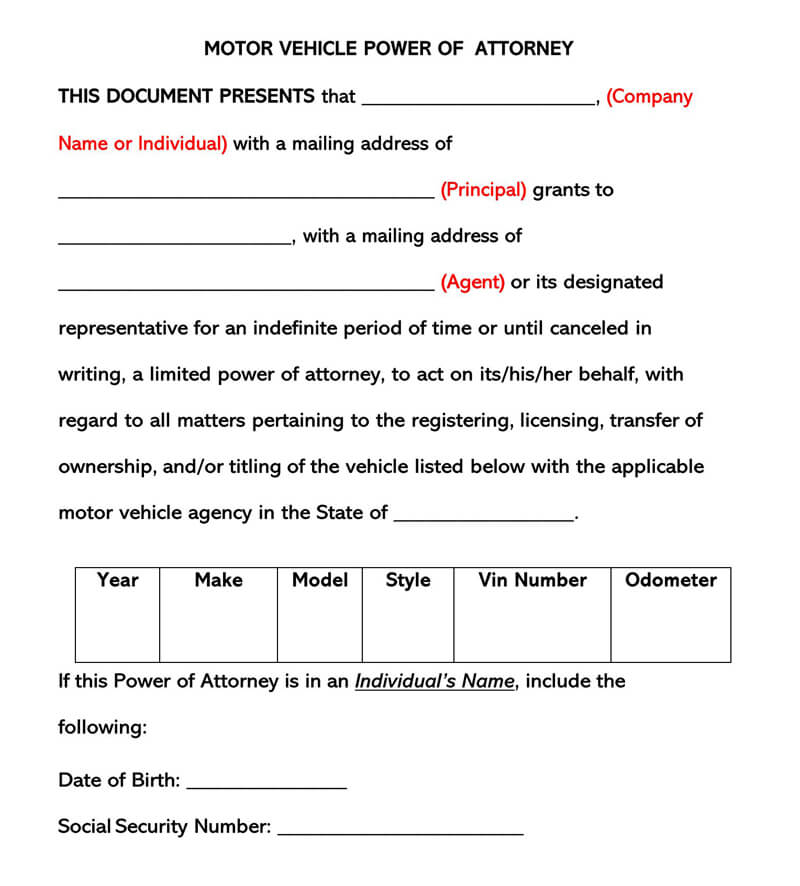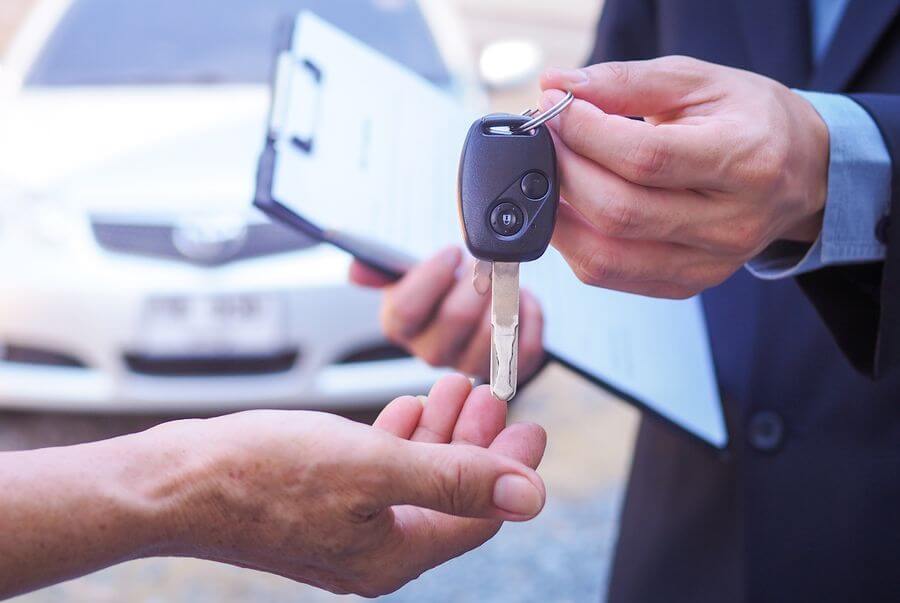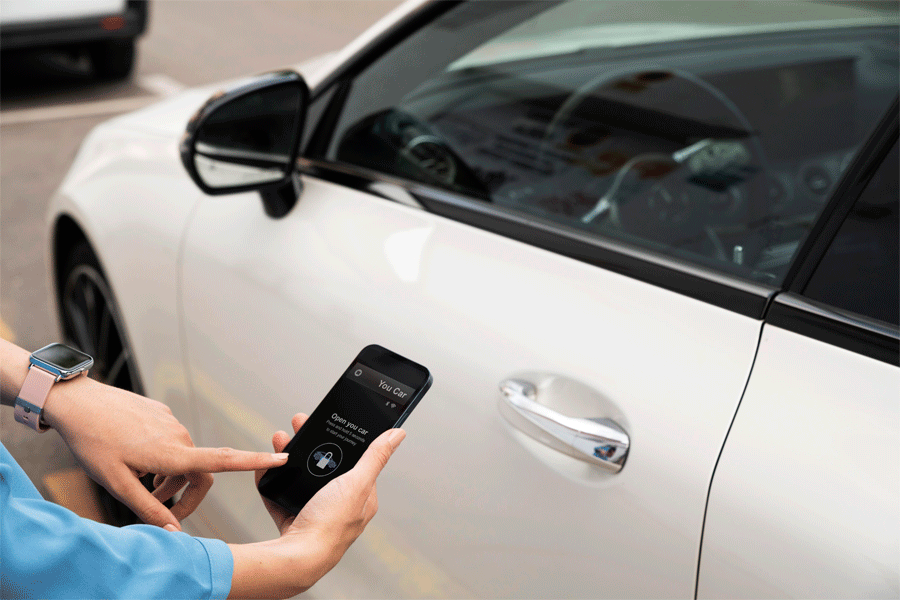This Form is used by a Vehicle Owner (referred to as the Principal) to delegate certain responsibilities such as purchasing, registering, titling, or selling a vehicle to another person. By definition,
A motor vehicle power of attorney is a legal avenue through which a person who owns a vehicle may delegate the responsibilities of registering, purchasing, titling, or selling the said automobile on his behalf.
The person authorized, referred to as the “Agent” or “Attorney-in-fact,” can take part in the transaction stated in the Form and sign the documents on the condition that the vehicle owner retains the original copy. In most states, Motor vehicle POA form is usually required to be signed in the presence of a notary public per the Power of Attorney (POA) laws regarding the property.
Various reasons warrant the use of these forms, including:
- If one is unable to attend to the needs of their vehicle physically
- One needs an employee to file the appropriate registration/title/paperwork for a company vehicle
- One needs to appoint an Agent to transfer the vehicle’s title
Sample Motor Vehicle POA Form

Free Motor Vehicle POA Forms (by State)
note
If the POA was drafted to sell a vehicle on behalf of the Principal, the form would have to be obtained from the specific state’s department that deals with the same to help complete the transaction.
Prerequisites
The Principal must first equip themselves with key information about the vehicle such as Make, Model, Year, Style, Vin Number, and Mileage Count before filling in the form. This information is important as it will be needed in the POA.
After making sure that all the information needed is available, the next thing is to appoint an Agent to take charge.
Next, fill and complete the motor vehicle POA, sign it, and have a notary public sign it to officiate it.
How to Give Vehicle Power of Attorney?
Knowing how to properly fill a POA Form is very important whether one is looking to have their vehicle registered, titled, sold, or purchased, and the transaction is to be carried out by their representatives.
Below are key steps to follow when filing the power of attorney form for motor vehicle:
Get a form
The first step is to obtain the Form from your state’s department and provide the required ownership records, i.e., certificate of title, proof of insurance, license plates, registration, and other documents. This information will be used to verify that the Principal is the actual owner of the vehicle.
Choose the powers
If the Principal is looking to restrict the powers granted to their Agent, they must properly outline such limitations in the Form. For instance, if the Agent is only permitted to register the vehicle, the Principal must properly indicate that in the Form. In most cases, the Motor Vehicle POA Forms are used when allowing an agent to sell a vehicle; therefore, one must tailor the Form to its specific use.
Mention the principal and agent
The Form must clearly define the Principal and the Agent, including their name, mailing address, and any other identifying items. It must also state the duration in which the Agent is authorized to act on behalf of the Principal.
Sample Clause
This document is to certify that Paul Scholes with the mailing address of 8638 valley arcade PR, 27 Paris, herein referred to as the Principal grants to Kevin Linwood, with a mailing address 972 Saint Street, PR 72 Paris, herein referred to as the Agent the Motor Vehicle Power of Attorney for an indefinite period or until cancelled in writing by the Principal to act on behalf, with regard to all matters regarding the registration, licensing, transfer of ownership, and/or tilting of the vehicle whose information is included below with the applicable motor vehicle agency in Paris.
Input the Vehicle Information
After defining the Principal and the Agent, the next step is to include the vehicle’s information to help distinguish the vehicle the Agent is being granted authorization on. Such information includes:
- Odometer reading
- Vehicle Identification Number
- Certificate of Title
- Registration
- Licence Plates
- Proof of Insurance
- Any other document required by the local motor vehicle office
Mention vehicle owner information
If the owner of the vehicle is a company, the information included should include the Federal ID/EIN. Else, the owner’s date of birth and social security number should be included in the Form.
Signatures
The next step is to sign the form to certify that the one acknowledges the document. One should also include the date of signing, especially if they are issuing a time-bound POA.
Notarization
After signing the document, the Principal should visit a notary public and have them notarize the document to make it official and bona fide. Only after the Form has been notarized can it be deemed valid for use in any transaction authorized by the Principal.
Notarization of the Form can be done in the following ways:
- Physical Location
- Financial institution (TD Bank, Chase, Bank of America)
- UPS Store
- NotaryDirectory
- Online
Only after the form has been notarized will the Agent be formally granted the POA.
Signing Requirements
Below are the signing requirements by state:
| STATE | FORM | SIGNING REQUIREMENTS |
| Alabama | MVT 5-13 | Notarize |
| Alaska | Form 847 | Notarize |
| Arizona | 48-1001 | Notarize |
| Arkansas | N/A | N/A |
| California | REG 260 | Owner of Vehicle |
| Colorado | DR 2175 | Notarize |
| Connecticut | A-83 | Two (2) Witnesses & Notarize |
| Delaware | Form MV386 | Notarize |
| Florida | HSMV 82053 | Owner of Vehicle |
| Georgia | Form T-8 | Notarize |
| Hawaii | DMVL596-2-09 | Notarize |
| Idaho | ITD 3368 | Notarize if Applying for Duplicate Title |
| Illinois | Power of Attorney | Owner of Vehicle |
| Indiana | State Form 1940 | Notarize |
| Iowa | Form 411021 | Notarize |
| Kansas | TR-41 | Owner of Vehicle |
| Kentucky | Vehicle Power of Attorney | Notarize |
| Louisiana | Motor Vehicle Power of Attorney | Notarize |
| Maine | Motor Vehicle Power of Attorney | Certified Technician and Notary Public |
| Maryland | VR-470 | Owner of Vehicle |
| Massachusetts | Motor Vehicle Power of Attorney | Certified Technician and Notary Public |
| Michigan | TR-128 | Owner of Vehicle |
| Minnesota | Motor Vehicle Power of Attorney | Certified Technician and Notary Public |
| Mississippi | Form 78-003-10-1-1-000 | Notarize |
| Missouri | Form 4054 | Notarize (Not Required if Signing Electronically) |
| Montana | MV65 | Notarize |
| Nebraska | Power of Attorney | Notarize |
| Nevada | VP136 | Notarize |
| New Hampshire | Motor Vehicle Power of Attorney | Notarize |
| New Jersey | Motor Vehicle Power of Attorney | Certified Technician and Notary Public |
| New Mexico | MVD–11020 | Notarize |
| New York | Motor Vehicle Power of Attorney | Certified Technician and Notary Public |
| North Carolina | MVR-63 | Notarize |
| North Dakota | Motor Vehicle Power of Attorney | Certified Technician and Notary Public |
| Ohio | BMV 3771 | Notarize |
| Oklahoma | Motor Vehicle Power of Attorney | Certified Technician and Notary Public |
| Oregon | Form 735-500 | Owner of Vehicle |
| Pennsylvania | Power of Attorney | Notarize |
| Rhode Island | Motor Vehicle Power of Attorney | Certified Technician and Notary Public |
| South Carolina | Motor Vehicle Power of Attorney | Notarize |
| South Dakota | MV-008 | Notarize |
| Tennessee | RV-F1311401 | Notarize |
| Texas | Form VTR-271 | Owner of Vehicle |
| Utah | Motor Vehicle Power of Attorney | Certified Technician and Notary Public |
| Vermont | Motor Vehicle Power of Attorney | Certified Technician and Notary Public |
| Virginia | VSA 70 | Owner of Vehicle |
| Washington | TD-420-050 | Notarize |
| West Virginia | DMV-9-TR | Notarize |
| Wisconsin | Motor Vehicle Power of Attorney | Certified Technician and Notary Public |
| Wyoming | Power of Attorney | Notarize |
Frequently Asked Questions
YES, he can! The powers give under this arrangement are largely discretionary. If an owner so wishes, it is possible to use the form to purchase or even resale a car. The only conditions here being that the owner has to be duly informed in advance prior to the execution of the sale.
YES, it does! We have already explained that the form has to be notarized to make it official and widely acceptable. Apparently, there is no provision for use of the form without this notarization. The conditions governing the notarization, however, varies from state to state.
Key Takeaways
It is important for the Principal to use the Motor Vehicle Power of Attorney Form when they are looking to appoint an Agent to do certain responsibilities on their behalf. The Form should be signed in the presence of a public notary in regard to the POA granted to the Agent. The Principal, after signing, should retain a copy of the Form for future reference.












